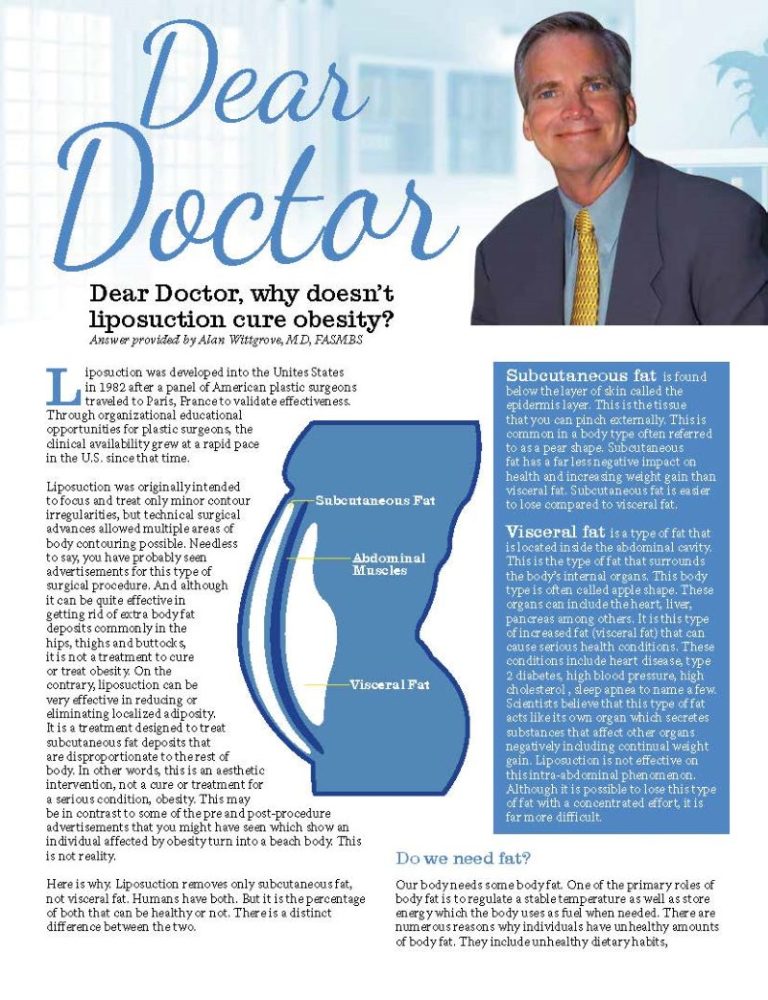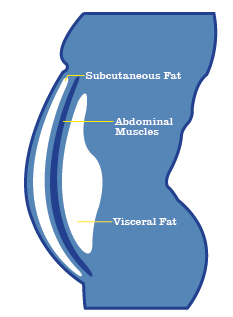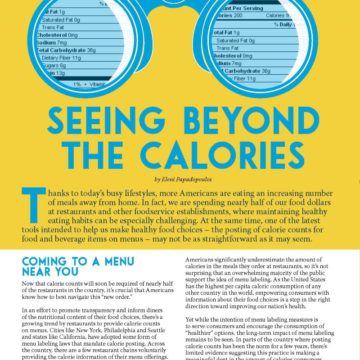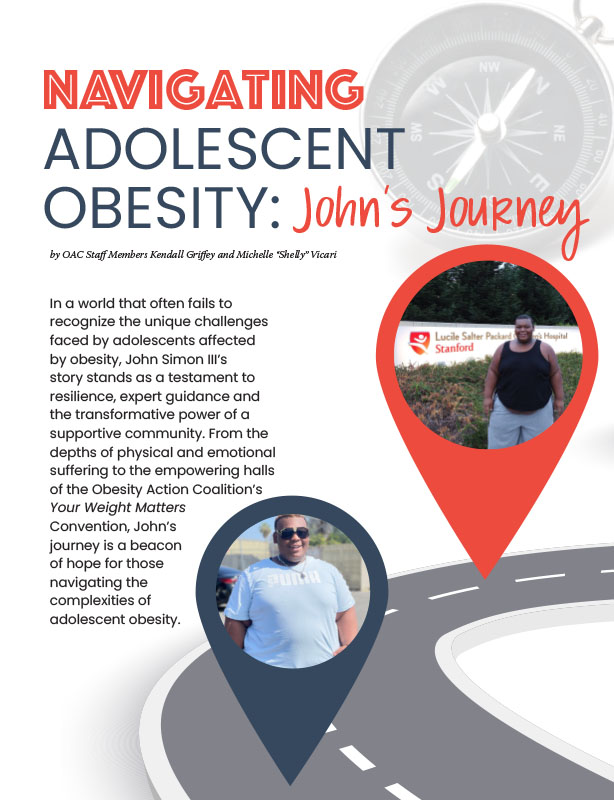Dear Doctor, why doesn’t liposuction cure obesity?


Answer provided by Alan Wittgrove, MD, FASMBS
Winter 2014
Liposuction was developed into the Unites States in 1982 after a panel of American plastic surgeons traveled to Paris, France to validate effectiveness. Through organizational educational opportunities for plastic surgeons, the clinical availability grew at a rapid pace in the U.S. since that time.
Liposuction was originally intended to focus and treat only minor contour irregularities, but technical surgical advances allowed multiple areas of body contouring possible. Needless to say, you have probably seen advertisements for this type of surgical procedure. And although it can be quite effective in getting rid of extra body fat deposits commonly in the hips, thighs and buttocks, it is not a treatment to cure or treat obesity. On the contrary, liposuction can be very effective in reducing or eliminating localized adiposity. It is a treatment designed to treat subcutaneous fat deposits that are disproportionate to the rest of body. In other words, this is an aesthetic intervention, not a cure or treatment for a serious condition, obesity. This may be in contrast to some of the pre and post-procedure advertisements that you might have seen which show an individual affected by obesity turn into a beach body. This is not reality.

Here is why. Liposuction removes only subcutaneous fat, not visceral fat. Humans have both. But it is the percentage of both that can be healthy or not. There is a distinct difference between the two:
Subcutaneous fat is found below the layer of skin called the epidermis layer. This is the tissue that you can pinch externally. This is common in a body type often referred to as a pear shape. Subcutaneous fat has a far less negative impact on health and increasing weight gain than visceral fat. Subcutaneous fat is easier to lose compared to visceral fat.
Visceral fat is a type of fat that is located inside the abdominal cavity. This is the type of fat that surrounds the body’s internal organs. This body type is often called apple shape. These organs can include the heart, liver, pancreas among others. It is this type of increased fat (visceral fat) that can cause serious health conditions. These conditions include heart disease, type 2 diabetes, high blood pressure, high cholesterol , sleep apnea to name a few. Scientists believe that this type of fat acts like its own organ which secretes substances that affect other organs negatively including continual weight gain. Liposuction is not effective on this intra-abdominal phenomenon. Although it is possible to lose this type of fat with a concentrated effort, it is far more difficult.
Do we need fat?
Our body needs some body fat. One of the primary roles of body fat is to regulate a stable temperature as well as store energy which the body uses as fuel when needed. There are numerous reasons why individuals have unhealthy amounts of body fat. They include unhealthy dietary habits, sedentary lifestyle, stress and genetics (family history related). Back in the days when humans were hunters and gathers, obesity was not a problem because food was scarce and people had to go for long periods of time without it. They also had to work very hard to get it when there was an opportunity; this included hunting and gathering plants. Mind you, there were no guns, automobiles, tractors or grocery stores hundreds of years ago. Due to this ancestry, our bodies create a protein called perilipin that settles around the fat protecting it from destruction. Because of our heritage, our bodies have learned to store fat for survival. This is what kept the human race alive. Interestingly, this is the same mechanism that may kill it. Somebody needs to tell it that we have grocery stores and we don’t need fat to hold on so stubbornly anymore!
Scientists have discovered that our genes contribute to obesity. Although it is still not understood completely, there is significant research that shows there are some people who have genetic (inherited) factors that make an individual’s body composition leaner or fattier. It seems that genes play a role on how we utilize energy from food. If this predisposition exists in an individual, then adding a more sedentary lifestyle, increase in saturated meals, packaged foods and daily sugar it is easy to see how the genetic factor along with environment and lifestyle can make the genetic factors more potent.
So, if liposuction doesn’t work, what can be done to reduce body fat and cure obesity? To date, no treatment today can cure obesity. There are treatment options that can be very helpful and therefore decrease body weight and fat percentage. They include: a healthy diet low in saturated fat and sugar, regular physical activity especially aerobic exercises, stress reduction and management, consistent seven to eight hours of sleep. Obesity medications can be a very helpful tool when combined with a healthy lifestyle, and bariatric surgery can be very effective on controlling obesity for individuals with a body mass index of 30 or greater.
Conclusion
In conclusion, there is not a “one procedure fix” to cure obesity including liposuction. Liposuction is designed as a treatment only for fat removal in specific areas and does not rid the body of the type of body fat that is not only more health threatening but also more metabolically active. This is the visceral fat not subcutaneous (fat that liposuction removes). Some people need to work much harder than others at losing excess weight and maintaining a healthy weight. Although some may focus on fat in the thighs and buttocks, it’s the fat that is deep inside that is the real culprit. Decreasing this type of body fat can’t cure obesity, but it can keep it in remission.
About the Author:
Alan Wittgrove, MD, FASMBS, has been a dedicated bariatric and metabolic surgeon for more than twenty years. He is the pioneer of laparscopic gastric bypass and the past president of the American Society for Metabolic and Bariatric Surgery.
by Kendall Griffey, OAC Communications Manager Spring 2024 We have officially kicked off Your Weight Matters Regional…
Read Articleby OAC Staff Members Kendall Griffey and Michelle “Shelly” Vicari Winter 2024 In a world that often…
Read Articleby Rachel Engelhart, RD; Kelly Donahue, PhD; and Renu Mansukhani, MD Summer 2023 Welcome to the first…
Read Article








